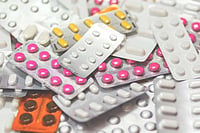Covid-19 infection is caused by the SARS-CoV-2 virus with a broad spectrum of manifestations. Researchers are intensely studying and collecting scientific and clinical evidence related to the subacute and long-term effects of the evolving Covid-19 infection, which can affect multiple organ systems.
When an infected person expels virus-laden droplets and someone else inhales them, the novel coronavirus, called SARS-CoV-2, enters the nose and throat. The lining cells of the nose are rich in a cell-surface receptor called angiotensin converting enzyme 2 (ACE2). Throughout the body, the presence of ACE2, which normally helps regulate blood pressure, marks tissues vulnerable to infection, because the virus requires this receptor to enter a cell.
Once inside, the virus coups the cell’s mechanism, making numerous copies of itself and invading new cells. Cellular damage, a robust innate immune response with inflammatory cytokine production, and a pro-coagulant (clotting of blood) state induced by SARS-CoV-2 infection may contribute to acquiring critical diseases post Covid-19 infection.
Effect on Lungs:
The lungs are the main organs affected by Covid-19. A spectrum of pulmonary manifestations, ranging from breathlessness (with or without oxygen dependence) to difficult ventilator weaning and fibrotic lung damage, has been reported among Covid-19 survivors. Patients with greater severity of acute Covid-19 are at the highest risk for long-term pulmonary complications, including persistent breathing difficulty and radiographic pulmonary abnormalities (such as pulmonary fibrosis).
Effect on Heart and blood vessels:
Covid-19 may cause the blood to clot more easily, inflammation of the heart muscles and small blood vessels, stress cardiomyopathy, ischemic injury caused by cardiac microvascular dysfunction, or coronary artery disease. The effects may show up as irregular heart rhythms, not enough blood getting to the tissues, or blood pressure low enough, that it requires medications. Covid-19 associated coagulopathy could increase the risk of a stroke or heart attack.
Effect on Kidney:
Some people hospitalized with Covid-19 have also had severe acute kidney injury (AKI) due to reduced oxygen supply to the kidneys, sometimes requiring renal replacement therapy (RRT).
Neuropsychiatric effects:
Covid-19 survivors have reported a post-viral syndrome of chronic malaise, diffuse myalgia, depression, anxiety, insomnia, and obsessive-compulsive symptomatology persisting or presenting months after initial infection. Loss of taste and smell may also persist after resolution of other symptoms in approximately one-tenth of patients at up to 6 months follow-up. The complications of acute Covid-19, such as stroke, posterior reversible encephalopathy syndrome, and acute disseminated myelitis, may lead to lingering or permanent nerve defects requiring extensive rehabilitation.
Nutrition and rehabilitation considerations:
Severe Covid-19, similar to other critical illnesses, causes catabolic muscle wasting, feeding difficulties, and frailty, each of which is associated with an increased likelihood of a poor outcome. Multisystem inflammatory syndrome in children (MIS-C) MIS-C is defined by the presence of the following symptoms in people.
(Dr. Sushil Jain is the Pulmonologist, Masina Hospital)






















